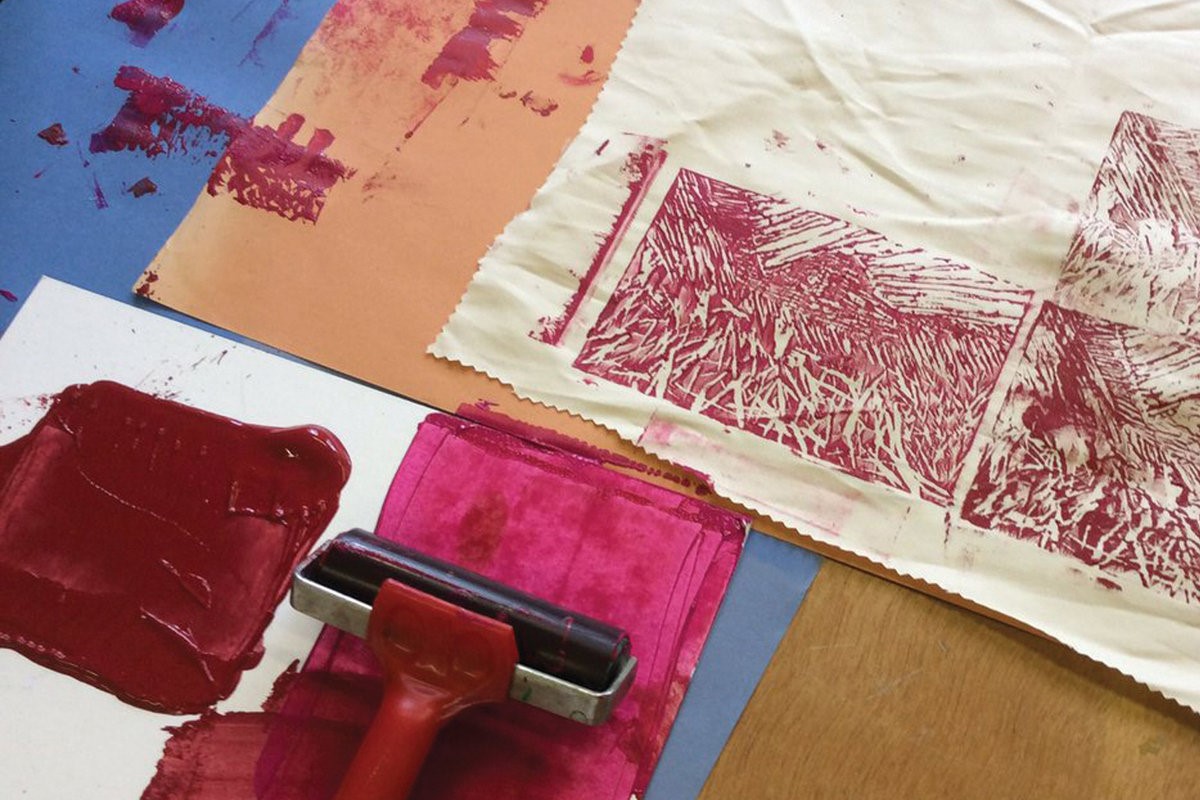
Printing workshops at the Silk Museum, Macclesfield
Photo: © Project INC
Opening up career opportunities in the cultural sector
A pioneering educational programme for neurodivergent young people has been given a boost from social impact investment. Seva Phillips has been talking to Lisa Alberti about her vision at Pinc College.
Pinc College runs creative study programme pathways for neurodivergent young people aged 16-25. Instead of classrooms, its art, digital art and complementary studies are delivered from campuses across the Northwest, Yorkshire and the Midlands, based in arts and cultural organisations. As founder and College Lead, Lisa Alberti leads the programme introducing young people to careers in the cultural and creative sectors.
Pinc College’s story began in 2016. “The very beginning was myself: a teacher with an idea of how things could be done differently,” Lisa Alberti explains. “I was someone who wanted to ask the question: Why not?”
Alberti had over 15 years’ teaching experience and a postgraduate degree in Education Leadership from the University of Manchester. She had a sense that things could be better for neurodivergent young people and wanted to explore an alternative approach.
“Our students often experience severe anxiety, and have struggled in mainstream colleges,” she explains. And so Pinc was born.
Alternative environments for experienced-based learning
The pioneering college offers a creative study programme with support for autism and neurodiversity. Its small group learning is very different from a traditional learning environment. Instead of the classroom, Pinc’s students’ learning experience takes place in galleries, museums and cultural institutions. “It’s really immersive,” Alberti says, “[it] really opens up a young person’s world to the possibilities of a career in the cultural sector”.
“What makes us unique is that we harness the collateral and assets of our cultural organisations in towns and cities to provide alternative environments and experience-based learning for our students – so we’re permanently based within cultural organisations.”
Pupils are referred by schools or local authorities and can explore a wide range of arts and cultural learning. Pinc provides a supported transition for Year 11 students, delivering this creative curriculum in these alternative settings. For students over 16, a separate pathway offers inclusive creative opportunities and hands-on work experience.
Importantly, all student learning plans are SENCO-approved – fully endorsed by trained Special Educations Needs Coordinators – and Pinc provides experienced pastoral support as part of the curriculum.
Social impact investment – a game changer
Central to Pinc College’s ethos was to question how things had been done in the past. “Why can’t the gallery or a museum be someone’s permanent place of learning?” asked Alberti. “Imagine what could happen. Imagine the impact on a young person if they attended weekly or daily.” Once they started, that impact was clear.
Since its inception, Pinc has grown across the Northwest and beyond. “We started with zero,” smiles Alberti. “Possibly minus! We had no backers. There was no huge cash injection, or board of well-connected directors and philanthropists that started this.”
Fundraising at the start was conventional – and will be familiar to cultural leaders. “Initially I wrote bids, and looked at grant funding, which supported some of the projects when we were a small social enterprise,” she explains. “[But that] took me away from our goals, our vision, our mission. And then it became a full-time job to try to sustain the finances. It was almost a double negative, and I knew we needed to move away from that.”
Finding the world of social impact investment was a game-changer. Pinc approached Arts & Culture Finance’s Arts Impact Fund [add hyperlink] for more than £200k of unsecured investment to fund setting up four learning bases over two years.
Scaling up the work up in this way “allowed us to think big”. “It’s allowed us to grow quite remarkably and to explore additional funding from alternative streams to enhance what we do. It’s allowed us to start to explore additional funding from alternative streams to enhance what we do. How can we work more with our parents and families? How can we harness that collateral to impact wider society?”
Shaping an inclusive workforce
The Arts Impact Fund, just like the current Arts & Culture Impact Fund, [add hyperlink] offers investment support to arts and culture organisations with a clear social purpose. For Alberti, connecting with Arts & Culture Finance came about “when we started to grow and ask how we could reach as many people as possible”.
The Arts Impact Fund offered “support and funding that would work for us while still allowing us to keep our authenticity and our uniqueness – without becoming part of a bigger organisation or having to dumb down what we do.”
It mattered to Alberti that the investment was tied so closely to the positive social impact of Pinc’s work. “We feel that our impact can be far-reaching because we’re also helping to shape an inclusive workforce for museums and galleries.” It’s a two-way street because “the cultural sector partner also gains from having a neurodivergent voice in the building that can help shape their visitor experience, and potentially shape their exhibitions”.
This period of growth has been transformative for Alberti and Pinc College: “The key focus has to be to keep your culture and authenticity at the centre of everything you do. What makes you unique? The thing that gives you that authenticity as an organisation, as a social enterprise – don’t lose that.”
Seva Phillips is Head of Arts & Culture Finance at Nesta.
![]() artsculturefinance.org
artsculturefinance.org
![]() @artsculturefin | @pinccollege
@artsculturefin | @pinccollege
This article, sponsored and contributed by Arts & Culture Finance, is one of a series demonstrating the impact repayable finance can make to the arts, culture and heritage sector.
Join the Discussion
You must be logged in to post a comment.